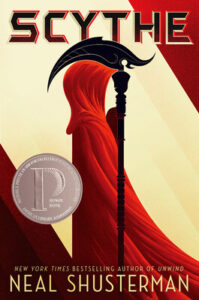By Kasey Short
 As AI becomes increasingly present and impactful in our daily lives, students are incredibly interested in the capabilities of and ethics surrounding different types of AI.
As AI becomes increasingly present and impactful in our daily lives, students are incredibly interested in the capabilities of and ethics surrounding different types of AI.
Middle school students are growing up in a world shaped by technology that has the power to drastically impact their future education and careers, and these kids have strong opinions about when, how and where it should be used. Adolescents are also beginning to form their own opinions about justice, identity, and what makes us human.
Fiction novels that explore AI through characters that are robots or humans that interact with or are impacted by AI offer an opportunity to spark discussions, build critical thinking, imagine the future, and engage readers with stories grounded in real ethical and scientific questions.
Discussion Questions
1. How does the AI technology in the story improve and harm humanity? Do you think overall it is more beneficial or harmful for humankind within the story?
2. What responsibility do you think the creators of AI have for their creation?
3. Is it possible for humans to have a friendship with AI in a meaningful way?
4. How does the AI in the story impact the way humans interact with each other?
5. How do the current capabilities of AI compare to the technology in the story?
6. What separates humans from machines? What if a human body includes pieces of technology? Where would you draw the line?
7. Do “robots” have the capacity to care about others?
8. Think about the AI/robot in the story. What were the limits and possibilities of for to learn and develop independently?
9. Does the AI have autonomy? What are the implications for humans if AI can think and make its own choices?
10. What is the danger of fearing something because it is different or new?
11. What are the dangers and benefits of trusting AI/robots to fulfill human needs?
12. Should there be limits on what AI can do? If so, who should make the rules?
Journal Prompts
1. Write a journal entry from the perspective of the AI in your book.
2. If you had an AI robot assistant, what would you want it to do and what would you never want it to do?
3. Would you want to be friends with the AI in your book? Explain.
4. If you found out your best friend was actually a robot, how would you feel and what would you do?
5. Imagine the world 50 years from now. How do you predict AI will be a part of everyday life?
6. Brainstorm a list of rules you think all AI should follow.
Recommended Middle Grade and Young Adult Books
Scythe by Neal Shusterman This young adult book is best for upper middle grade students and explores a world without sickness, crime, poverty, or aging. Instead it is governed by an AI system that determines who lives and who dies by ordering the Scythes to end the lives of others. The book follows two teens who have recently begun training to become Scythes and who navigate the truths behind their society. This is the first of a series that throughout each book continues to examine themes of power and control in terms of government, technology, and AI as well as examines the importance and potential of humanity.
This young adult book is best for upper middle grade students and explores a world without sickness, crime, poverty, or aging. Instead it is governed by an AI system that determines who lives and who dies by ordering the Scythes to end the lives of others. The book follows two teens who have recently begun training to become Scythes and who navigate the truths behind their society. This is the first of a series that throughout each book continues to examine themes of power and control in terms of government, technology, and AI as well as examines the importance and potential of humanity.
The School for Whatnots by Margaret Peterson Haddix
 This is a fantastic introduction to the implications of AI, suitable for younger middle grade students. Max lives in a world where some children are human and others are robots, and it is difficult if not impossible to tell the difference between the two. After Max’s best friend disappears, he begins to uncover the fact that his entire school is filled with “robot” children called Whatnots that were created to be friends with wealthy children. He then begins rethinking the meaning of friendship and what it means to be “real.”
This is a fantastic introduction to the implications of AI, suitable for younger middle grade students. Max lives in a world where some children are human and others are robots, and it is difficult if not impossible to tell the difference between the two. After Max’s best friend disappears, he begins to uncover the fact that his entire school is filled with “robot” children called Whatnots that were created to be friends with wealthy children. He then begins rethinking the meaning of friendship and what it means to be “real.”
The Adoration of Jenna Fox by Mary E. Pearson
 This book address AI without mentioning it by name and focuses heavily on the ethics of technology and what makes someone human. After waking up from a coma with no memories, Jena eventually realizes that her body and all but ten percent of her brain have been reconstructed illegally with “bio-gel.” She struggles with her own humanity and the choices her parents have made about her mind and body without her consent.
This book address AI without mentioning it by name and focuses heavily on the ethics of technology and what makes someone human. After waking up from a coma with no memories, Jena eventually realizes that her body and all but ten percent of her brain have been reconstructed illegally with “bio-gel.” She struggles with her own humanity and the choices her parents have made about her mind and body without her consent.
 Perfect for younger middle grades readers, it gently introduces complex ideas about the capabilities of technology and what makes something “alive.” Roz the robot wakes up on an island and ends up making friends with and caring for an animal, even taking on a parental role with a gosling. Throughout the book Roz the robot shows empathy for other animals and continues to adapt and learn about herself and the world around her. (Now a three-book series, plus a picture book The Wild Robot On The Island. The popular DreamWorks film was released in 2024.)
Perfect for younger middle grades readers, it gently introduces complex ideas about the capabilities of technology and what makes something “alive.” Roz the robot wakes up on an island and ends up making friends with and caring for an animal, even taking on a parental role with a gosling. Throughout the book Roz the robot shows empathy for other animals and continues to adapt and learn about herself and the world around her. (Now a three-book series, plus a picture book The Wild Robot On The Island. The popular DreamWorks film was released in 2024.)
 Cog which is short for cognitive development, looks like a twelve-year-old boy but is a robot who was built to learn. He ends up on a mission with other robots to save the scientist who created him and escape from people who are trying to study him.
Cog which is short for cognitive development, looks like a twelve-year-old boy but is a robot who was built to learn. He ends up on a mission with other robots to save the scientist who created him and escape from people who are trying to study him.
Other AI-related books
The Superteacher Project by Gordon Korman
Show Us Who You Are by Elle McNicoll
Your Robot Dog Will Die by Arin Greenwood
The Lion of Mars by Jennifer L. Holm
Short Story Suggestions
(Teacher review recommended)
“Robbie” and “Reason” by Isaac Asimov
“The Veldt” and “There Will Come Soft Rains” by Ray Bradbury
“The Machine Stops” by E.M. Forster
“The Fun They Had” by Isaac Asimov
“Cat Pictures Please” by Naomi Kritzer
“Evil Robot Monkey” by Mary Robinette Kowal
“Valedictorian” by N.K. Jemison
AI is here to stay
Artificial intelligence is rapidly becoming part of our everyday lives and our classrooms. Middle grade and YA books that explore AI and ethics are great conversation starters. These stories encourage students to think deeply about their values, the role of technology, and what it means to be human while encouraging students to consider the future they hope for themselves and our world.
What fiction would you recommend to explore AI’s impact? Share your ideas in the comments.
Kasey Short is the Middle School Director of Studies and an 8th Grade English Teacher and Advisor at Charlotte (NC) Country Day School. She loves to share ideas from her classroom and her leadership roles.
Kasey attended the University of North Carolina at Chapel Hill where she earned a bachelor of arts in middle school education with a concentration in English and history. She went on to earn a master’s in curriculum and instruction from Winthrop University.
Browse all of Kasey’s MiddleWeb articles here and follow her at Bluesky.


